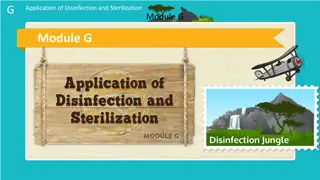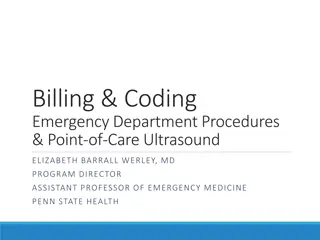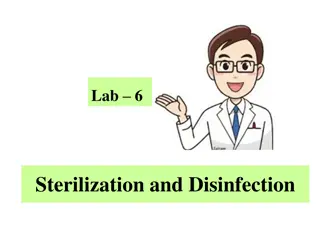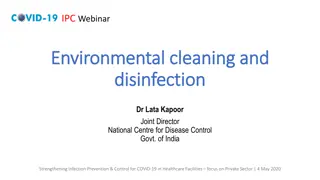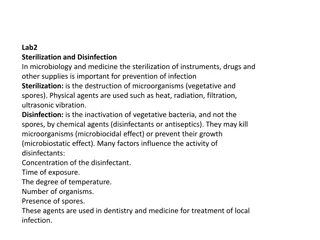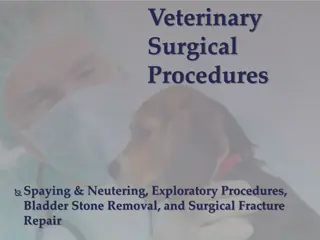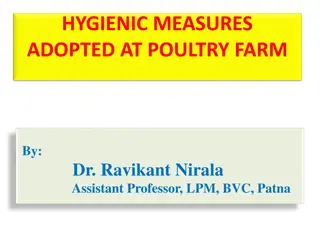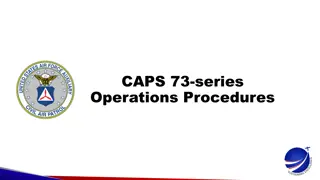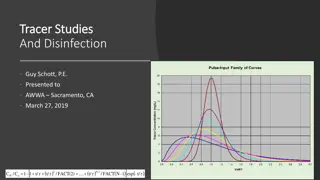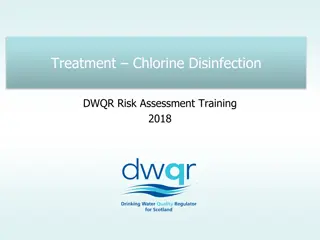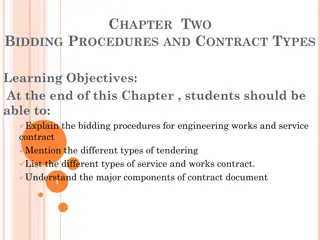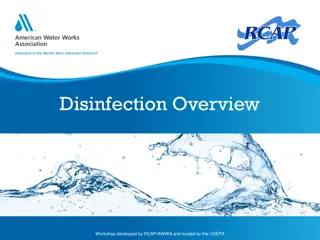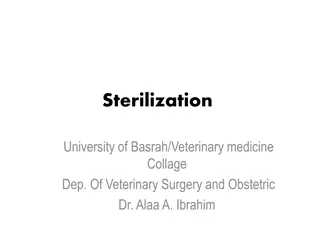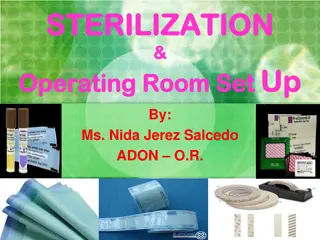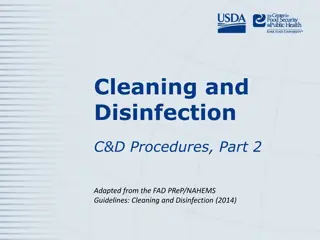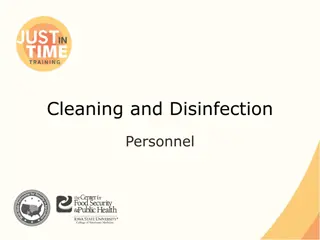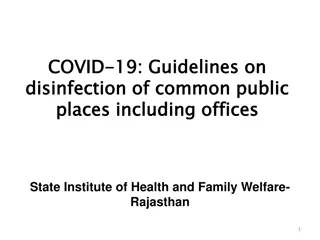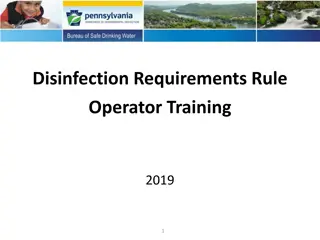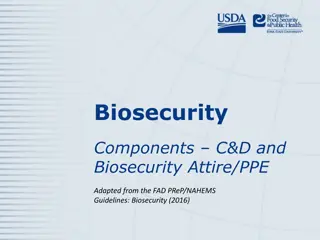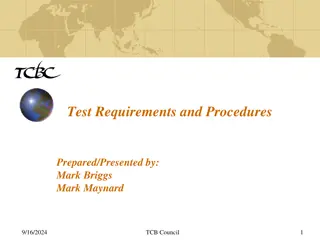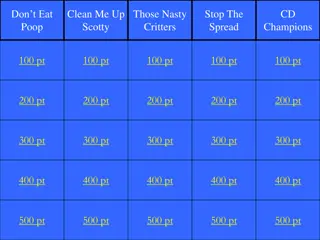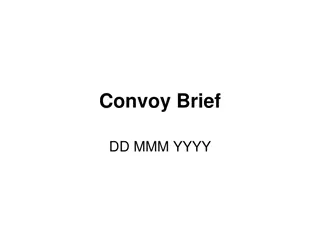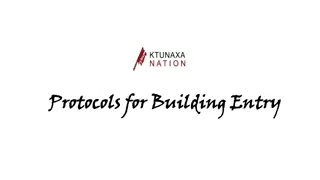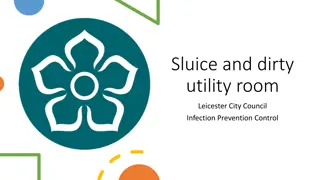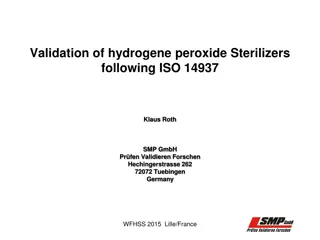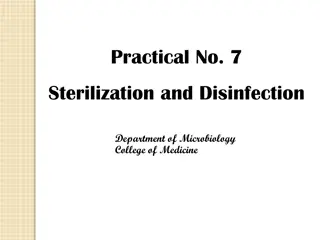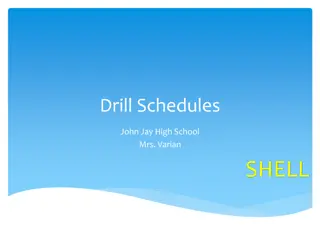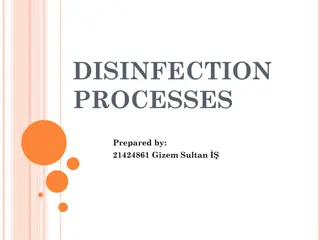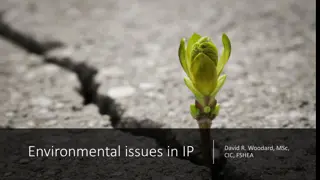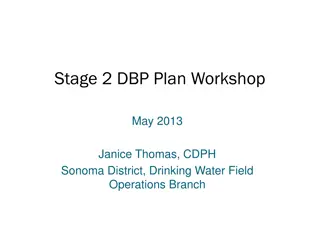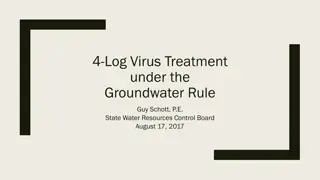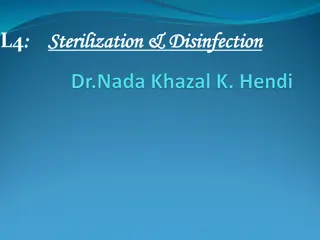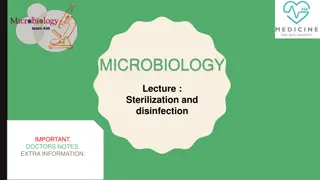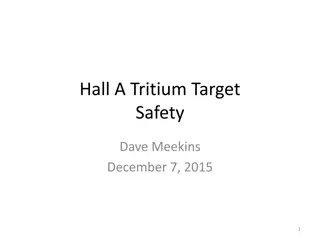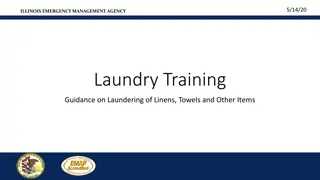Standard Precautions in Dental Settings
Standard Precautions in Dental Settings emphasize the importance of hand hygiene, proper use of personal protective equipment, aseptic techniques, clinical asepsis, and environmental surface disinfection to control infections. Adherence to these precautions minimizes the risk of spreading microorgan
0 views • 21 slides
Best Practices for Disinfection and Sterilization in Healthcare Settings
Explore the application of disinfection and sterilization in various healthcare settings like outpatient facilities, physical therapy, hydrotherapy, gym areas, and portable equipment. Learn about the importance of following strict infection control practices, cleaning protocols, and disinfectant rec
1 views • 27 slides
Water Purification Methods and Techniques Explained
Explore the purification of water on both large and small scales, including storage, filtration, and disinfection processes. Learn about different methods such as boiling, chemical disinfection, and filtration for household water purification. Discover the importance of treatment based on the nature
4 views • 66 slides
Important Guidelines for Ensuring Safety in Medical Environments
Providing guidance on essential practices in medical settings, this collection highlights topics such as cleaning, disinfection, vaccinations, and personal protective equipment. It emphasizes the significance of maintaining cleanliness, following safety protocols, and recognizing high-touch surfaces
2 views • 62 slides
Billing, Coding, and Reimbursement in Emergency Department Procedures
Explore the world of billing, coding, and reimbursement in emergency department procedures, covering topics such as E/M codes, critical care codes, CPT codes, RVUs, general approach to procedures, and modifiers. Understand the nuances of documenting procedures and maximizing reimbursement potential.
4 views • 41 slides
Understanding Sterilization and Disinfection Methods in Laboratory Settings
Sterilization involves killing all microorganisms while disinfection targets pathogenic ones. Various methods like heat, filtration, radiation, and chemicals are used for effective sterilization. Physical sterilization through heat includes dry heat, direct flaming, hot air ovens, and incineration.
4 views • 21 slides
Best Practices for Environmental Cleaning and Disinfection in Healthcare Settings
Effective environmental cleaning and disinfection are crucial in reducing healthcare-associated infections, especially in the context of COVID-19. This webinar by Dr. Lata Kapoor emphasizes the importance of cleaning high-touch surfaces and implementing established cleaning strategies to remove biob
0 views • 18 slides
Sterilization and Disinfection in Microbiology and Medicine: Importance and Methods
Sterilization and disinfection are crucial in preventing infections in microbiology and medicine. Sterilization involves the destruction of microorganisms, while disinfection targets vegetative bacteria using chemical agents. Factors affecting disinfectant activity include concentration, time of exp
1 views • 7 slides
Veterinary Surgical Procedures Overview
Veterinary surgical procedures such as spaying, neutering, exploratory surgeries, bladder stone removal, and surgical fracture repair are essential for maintaining the health and well-being of animals. Exploratory procedures help diagnose issues when other tests fail to reveal abnormalities, and sur
1 views • 31 slides
Hygienic Measures for Poultry Farm Management
Poultry waste management, farm hygiene, sanitation, and environmental issues are critical for maintaining a healthy poultry farm. Disinfection, while important, is not a substitute for cleanliness. Effective disinfectants should have good germicidal activity, be non-toxic to humans and birds, work o
0 views • 18 slides
Civil Air Patrol Operations Procedures and Philosophy
Explore the comprehensive operations procedures and philosophy of the Civil Air Patrol (CAP), emphasizing the importance of professionalism, teamwork, and adherence to standards. Learn about the core procedures, mission planning, briefing, risk assessment, and the ultimate responsibility of the pilo
0 views • 8 slides
Understanding Tracer Studies and Disinfection in Water Treatment
Tracer studies play a crucial role in determining hydraulic efficiencies and disinfectant exposure times in water treatment processes. This presentation by Guy Schott covers the purpose of tracer studies, water age distribution, disinfection exposure time, CT disinfection, log inactivation, and more
0 views • 34 slides
Essential Guidelines for Chlorine Disinfection in Water Treatment
Learn about the usage and key points to watch for when implementing chlorine disinfection in water treatment processes. Understand the effectiveness, dosing methods, safety considerations, and monitoring protocols to ensure successful water disinfection. Proper handling of hypochlorite solution, mon
1 views • 7 slides
Bidding Procedures and Contract Types in Engineering Works
Understanding the standard bidding documents, types of tenders, and bid qualification procedures in engineering works and service contracts is crucial for effective project procurement. The significance of standard bidding procedures, scope and value of contracts, types of tenders, and bid qualifica
1 views • 31 slides
Comprehensive Overview of Water Disinfection and Chlorination Basics
This workshop explores the importance and various methods of water disinfection, focusing on chlorination basics, chloramines, disinfection types, and the impacts of pH on chlorine disinfection. Learn about the necessity of disinfection in water systems, different disinfectants used, and the need fo
0 views • 37 slides
Guidelines on Sterilization, Disinfection, and Types of Disinfectants in Veterinary Medicine
Sterilization is the process of eliminating all microorganisms from an object, while disinfection reduces the number of pathogenic microorganisms on surfaces. Various types of disinfectants exist, including high-level, intermediate-level, and low-level options. Different equipment items in veterinar
0 views • 18 slides
Understanding Sterilization and Aseptic Techniques in Operating Room Setup
Explore the methods and processes of sterilization, principles of aseptic techniques, and operating room setup for patient safety. Learn terminologies related to sterilization, asepsis, sepsis, antiseptics, and disinfection to ensure a sterile environment for medical procedures.
0 views • 103 slides
High-Quality Disinfection Products to Protect Your Business
Step into a safer, cleaner world with Chemical Essentials\u2019 high-quality disinfection products. \n\nOffering unmatched microbial kill and unrivalled safety, it's the ideal choice for any setting, from laboratories to home kitchens. \n\nIts unique
2 views • 3 slides
Biosecurity Cleaning and Disinfection Procedures
This guide outlines biosecurity cleaning and disinfection procedures, including small-scale C&D stations, personal protective equipment protocols, personnel decontamination steps, emergency medical situation guidelines, and equipment sanitation measures. It emphasizes the importance of thorough clea
0 views • 21 slides
Cleaning and Disinfection Personnel Training Guide
This training guide focuses on preparing personnel for effective cleaning and disinfection practices. It covers essential steps such as preparation of disinfectant solutions, biosecurity work zones, basic protocol for cleaning, and procedures in the hot zone. It emphasizes the importance of using EP
0 views • 17 slides
Guidelines for COVID-19 Disinfection of Public Places and Offices
Guidelines from the State Institute of Health and Family Welfare in Rajasthan for the environmental cleaning and decontamination of common public places and offices to combat the spread of COVID-19. The guidelines cover areas like indoor spaces, high-contact surfaces, and office premises, detailing
0 views • 21 slides
Operator Training 2019: Disinfection Requirements Rule Overview
This training course provides a comprehensive overview of the Disinfection Requirements Rule for water system operators. Covering topics such as changes in disinfectant residual requirements, affected water systems, distribution system challenges, and more, operators will gain valuable insights and
0 views • 26 slides
Biosecurity Cleaning and Disinfection Guidelines
The presentation covers the essential components of biosecurity plans, focusing on Cleaning and Disinfection (C&D) as well as Biosecurity Attire/Personal Protective Equipment (PPE). It includes detailed information on C&D methods, processes, and factors affecting disinfecting efficacy, as per the FA
0 views • 19 slides
Test Requirements and Procedures Overview for TCB Council Meeting
This document outlines the test requirements and procedures prepared by Mark Briggs and Mark Maynard for the TCB Council meeting scheduled for September 16, 2024. It covers EMC test procedures, FCC regulations, Industry Canada standards, RF exposure procedures, and equipment certification guidelines
0 views • 25 slides
Don't Eat Poop: Hygiene and Infection Prevention Guide
This comprehensive guide covers various aspects of hygiene and infection prevention, emphasizing the importance of hand hygiene, proper cleaning procedures, and protective measures to stop the spread of infectious diseases. From handwashing to surface disinfection, the content provides valuable insi
0 views • 51 slides
Convoy Operation Brief and Standard Operating Procedures
Detailed information on convoy briefing, roll call, agenda, standard and special brief checklists, and standard operating procedures for military convoy operations in potentially hostile environments. The content covers essential guidelines and protocols including route planning, contact actions, ve
0 views • 8 slides
Protocols for Building Entry and Sanitization Guidelines
These protocols outline the procedures for building entry, emphasizing social distancing, directional travel, and sanitization requirements. Employees must enter through designated doors, proceed to the Sanitizing Room for item disinfection, and follow PPE guidelines. The guidelines also cover guest
0 views • 11 slides
Essential Guidelines for Sluice and Utility Room Management
Sluices and dirty utility rooms play a crucial role in managing bodily fluids to prevent the spread of infectious diseases. Proper cleaning, disinfection, and maintenance are vital for effective use. This article provides detailed instructions on setting up and maintaining these facilities, includin
0 views • 6 slides
Validation of Hydrogen Peroxide Sterilizers Following ISO 14937 - Klaus Roth SMP GmbH
Klaus Roth SMP GmbH in Tuebingen, Germany specializes in the validation of cleaning, disinfection, and sterilization processes, with a focus on different sterilization methods such as steam, ethylene oxide, formaldehyde, and hydrogen peroxide. They conduct research in prions, test new instrument des
0 views • 25 slides
Sterilization and Disinfection Methods in Microbiology
Sterilization and disinfection are crucial processes in microbiology to eliminate all microorganisms and prevent their spread. Methods such as heat, ethylene oxide gas, and filtration are employed to achieve sterilization. Physical agents like heat through dry heat, flaming, and hot air ovens, as we
0 views • 27 slides
Emergency Drill Procedures at John Jay High School
Emergency drill procedures at John Jay High School including Shelter in Place, Hold in Place, Evacuation (Fire Drill), Lockout, Lockdown, and Bus Drill. The procedures outline steps to be taken during various types of emergencies to ensure the safety of all students and staff members. Each drill has
0 views • 7 slides
Understanding Disinfection Processes and Mechanisms
Disinfection is the process of partially destroying disease-causing organisms, different from sterilization where all organisms are destroyed. Various mechanisms of disinfectants include damaging cell walls, altering permeability, and inhibiting enzyme activity. Chemical and physical agents such as
0 views • 24 slides
Environmental Issues in Infection Prevention: Addressing Challenges and Best Practices
Addressing environmental issues in infection prevention is crucial for maintaining a safe healthcare facility. The challenges include room cleaning during hospitalization, disinfection post-discharge/transfer, time constraints, cost containment, ongoing education, competency assessment, and outcome
0 views • 19 slides
Overview of Cleaning Agents and Disinfectants in Healthcare Settings
Cleaning and disinfection play a crucial role in maintaining hygiene and preventing infections in healthcare settings. Cleaning involves the removal of foreign material from surfaces, while disinfection kills microorganisms. Hospital-grade disinfectants like alcohols, chlorine, phenolics, and hydrog
0 views • 13 slides
Understanding Drinking Water Disinfection Byproducts Regulations
This content covers essential information about Stage 2 Disinfection Byproducts (DBP) regulations, including workshop schedules, reasons for plan redoing, acronyms, the purpose of DBP regulations, application to water systems, and carryover from Stage 1 DBP. It emphasizes the risks associated with d
0 views • 36 slides
Understanding 4-Log Virus Treatment and Groundwater Rule Compliance
This collection of images and information delves into the importance of 4-log virus treatment under the Groundwater Rule, regulatory requirements for groundwater systems, the basics of Ct calculations for disinfection, types of disinfectants used, and understanding log inactivation of viruses. The c
0 views • 24 slides
Understanding Sterilization and Disinfection Methods
Sterilization involves killing all microorganisms, including bacterial spores, using physical, chemical, and mechanical methods. Disinfection, on the other hand, focuses on removing microorganisms using disinfectants. Chemical methods like antiseptics and disinfectants play a crucial role in ensurin
0 views • 18 slides
Essential Concepts in Sterilization and Disinfection Practices
Understanding the principles of sterilization and disinfection is crucial in medical settings. This lecture covers topics such as defining sterilization, disinfectants, and antiseptics, different methods of sterilization (physical and chemical), the significance of heat sterilization, dry and moist
0 views • 19 slides
Tritium Safety Protocols and Containment Procedures for Hall A Target Facility
This document outlines the safety protocols and containment procedures related to tritium handling at the Hall A Target Facility. It covers various aspects such as tritium containment, procedures development, access control, truck ramp protocols, and controlled access procedures. Detailed instructio
1 views • 45 slides
Emergency Laundry and Cleaning Guidance from Illinois Emergency Management Agency
The Illinois Emergency Management Agency provides detailed guidance on laundering linens, towels, and other items, as well as cleaning soft surfaces during emergencies. The instructions cover the proper use of personal protective equipment, laundering procedures, and disinfection methods recommended
0 views • 4 slides

